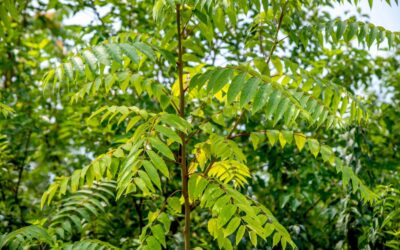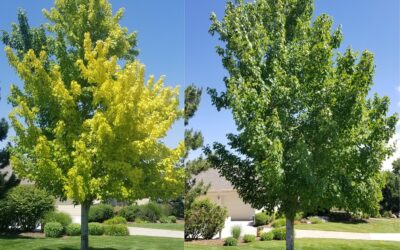Stroll through Denver’s Washington Park or Capitol Hill neighborhoods in late summer and you’re likely to see a stately tree full of fragrant white flowers interspersed among bright green fern-like leaves. It’s a Japanese Pagoda tree, a versatile choice that doubles as both an ornamental and a shade tree.
Origin of the Pagoda Tree
Actually native to China, Korea and Vietnam, the Pagoda Treegot its name due to its use as a decorative planting around Japanese temples, where it was first noted by Western botanists. Its alternate name, the Chinese Scholar Tree, is more accurate and probably comes from its widespread planting around Chinese temples and tombs where its furrowed bark and thick canopy may have served as a respite from summer heat for peaceful study and contemplation.
Planting, Tolerance and Growth
The Japanese Pagoda Tree likes full sun, rich, well-drained soil and moderate watering, but once established, it’s a hardy specimen that tolerates urban conditions well and requires little maintenance. You’ll even find some in sidewalk plantings in Denver’s Lower Downtown area.
Established trees are both heat and drought tolerant and are largely disease and pest resistant. It grows at a moderate rate, reaching from 35 feet up to 75 feet in height with a comparable spread. Its fern-like leave grow in stalks of 10-15 leaves and the creamy white, pea-like flowers bloom on long, upright panicles up to 15 inches long. You need to be patient, though—Pagoda Trees can take up to 10 years to begin flowering.
Flowering, Herbal and Timber Uses
Once they begin flowering, you’ll have showy blossoms in late summer, well after most other trees have lost their bloom. The flowering lasts about a month, followed by long, ornate seed pods.
A deciduous tree, the Japanese Pagoda’s leaves briefly turn yellow before dropping late in the fall. While its seeds are toxic, the Pagoda Tree’s leaves and flowers are used in over a dozen homeopathic compounds and are one of the 50 fundamental herbs of traditional Chinese medicine. Its dark, brown timber is strong and springy and is used for furniture and tools.
If you’re considering planting Japanese Pagoda Trees or other landscape trees and shrubs, or have ones that need maintenance, Donovan Arborists offers planting, pruning, and shearing services in the Denver area. We’re happy to give free estimates to homeowners and property managers for any services they may need.


